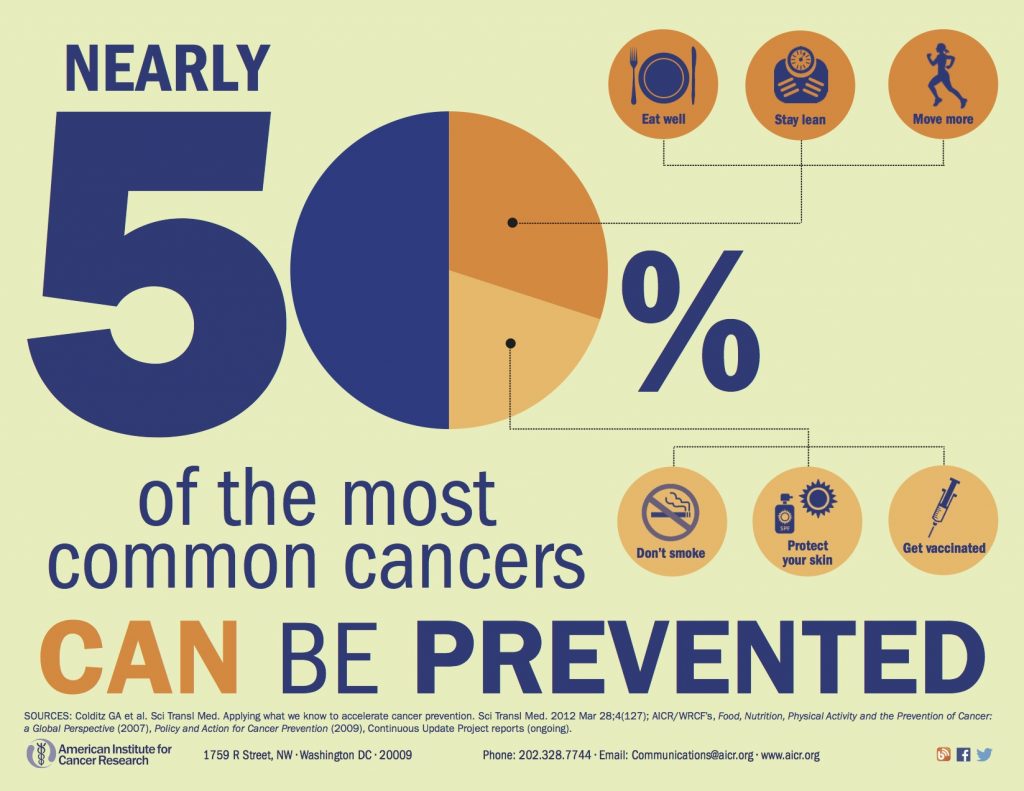Half of cancers – one of every two cases – can be prevented and so often it’s about applying what we already know. That was the simple but powerful message at the first Cancer Prevention Summit held by the New York State Department I attended last week. The overarching message of the Summit was simple: 50% of cancers can be prevented and in New York State, where approximately 35,000 people die from cancer each year, primary cancer prevention is an urgent public health priority.
 Experts spoke about vaccinating against HPV and preventing tobacco use, two major causes of cancers. What fewer people may know is there are concrete things that we can do to reduce our risk. Maintaining a healthy weight, engaging in regular physical activity, and eating well can prevent approximately one of three of the most common cancers.
Experts spoke about vaccinating against HPV and preventing tobacco use, two major causes of cancers. What fewer people may know is there are concrete things that we can do to reduce our risk. Maintaining a healthy weight, engaging in regular physical activity, and eating well can prevent approximately one of three of the most common cancers.
Summit highlights included:
Shift the discussion to the notion that “cancer is preventable.” Begin to focus effort and awareness on risk reduction through modifiable lifestyle habits. This includes eating a predominantly plant-based diet, achieving and maintaining a healthy weight, exercising regularly, using sunscreen, participating in cancer screening, and avoiding tobacco use and heavy alcohol.
“By implementing what we know, we can prevent 50% of cancers,” said Graham Colditz, MD, DrPH. And outlined 8 concrete ways to do so.
So often the discussion about cancer and cancer prevention begins at our kitchen table with our kids, and among family and friends, were among the opening remarks of Howard Zucker, MD, JD, Commissioner of the New York State Department of Health. He along with Margaret Cuomo, MD and Lieutenant Governor Kathy Hochl, urged the audience to think about how we can work together to make the discussion about “cancer prevention” a priority in our workplaces, our communities, and all of our networks. We can start very simply by encouraging those around us to engage in healthy behaviors while we work to build an environment and society that will make the healthy choice, the easy choice.
Timing: it’s never to early and never too late to think about cancer prevention. While there is a need to start thinking about cancer prevention in childhood and early adolescence, it is also never too late to think about cancer prevention by losing weight after menopause or quitting smoking at any point in life.
A prospective study investigating age-specific physical activity and breast cancer found that young women who sustained physical activity between the ages of 12-22 years had a 25% decrease risk in premenopausal breast cancer, more powerful than increases in physical activity after 32 years of age in this particular study.
More work is needed to better understand the timing of interventions, however we know the benefits of healthy lifestyle changes are often not realized for several years, sometimes decades, pointing to the fact that the earlier individuals can adopt healthy habits, the better.
Walter Willett, MD, ScD, pointed out the many challenges with nutrition research stating that the duration and timing of positive dietary habits are unclear and the many confounding factors, and the limitation of study design must be taken into account.
Learn from our past public health triumphs. Progress in lower smoking rates, increased screenings and other actions have led to lower rates of many cancers (lung and colorectal). Re-engineering cities have led to healthier choices, such as NYC making physical activity more accessible.
What did it take to achieve these milestones? It took dedicated individuals in communities, business and healthcare sectors, organizations, hospitals, and media campaigns, all working together to achieve a common goal.
When you think about cancer prevention, where in your home-life could the science of cancer prevention translate into action? What can you do to make positive lifestyle changes? What are you doing in your community to make cancer prevention a priority?
Actions could be simple such as encouraging individuals close to us to eat better or exercise more – or on a larger scale, such as changing workplace policies and that could be translated to a wider audience. Tell us.
Tell us.
You can watch the whole, or parts of, the Cancer Prevention Summit here.
Christine L. Sardo Molmenti, PhD, MPH, RD, is AICR’s Science Analyst. Chris is a a cancer epidemiologist at Columbia University’s Mailman School of Public Health and specializes in making the science of cancer prevention understandable, and doable.
You can connect with her on twitter @christinesardo.





